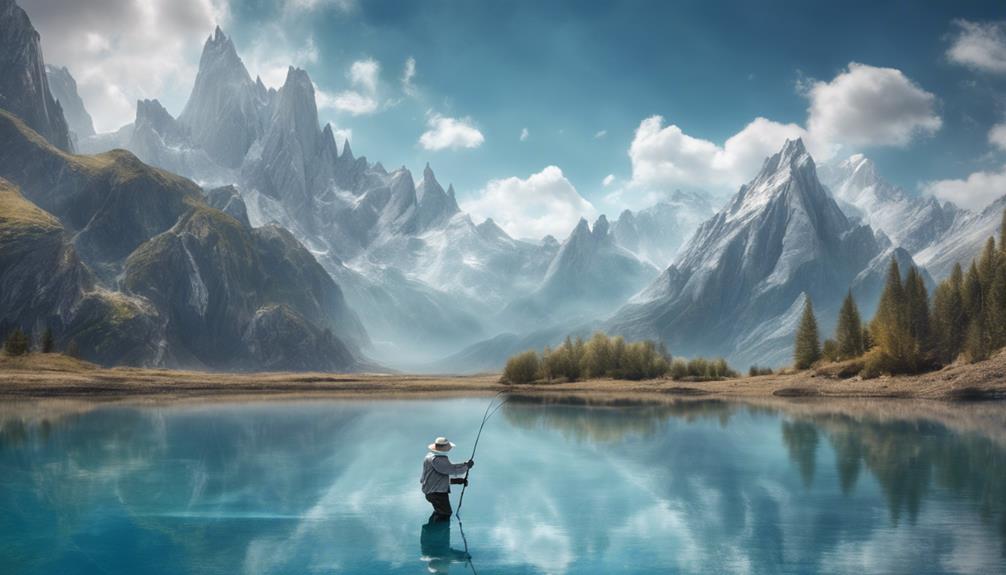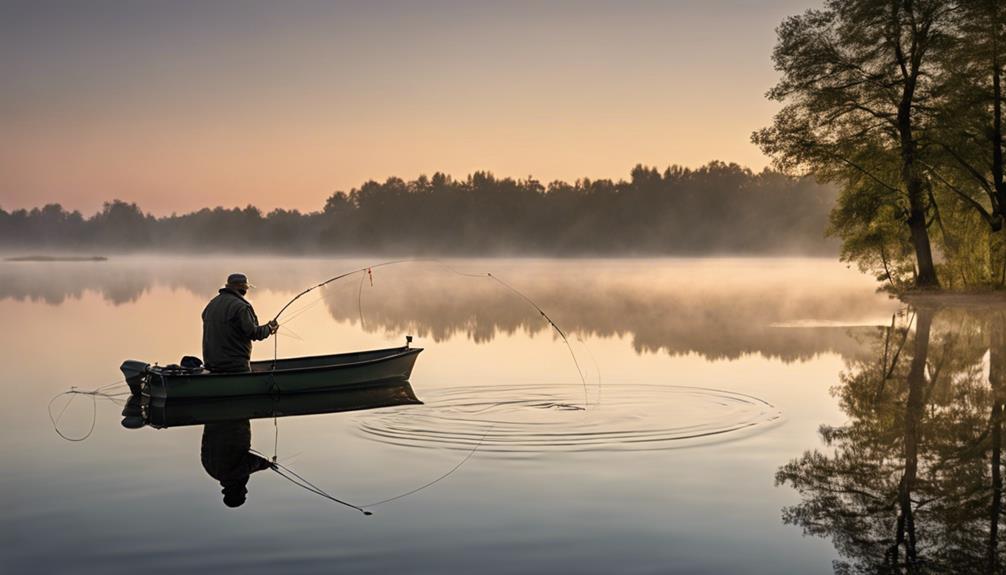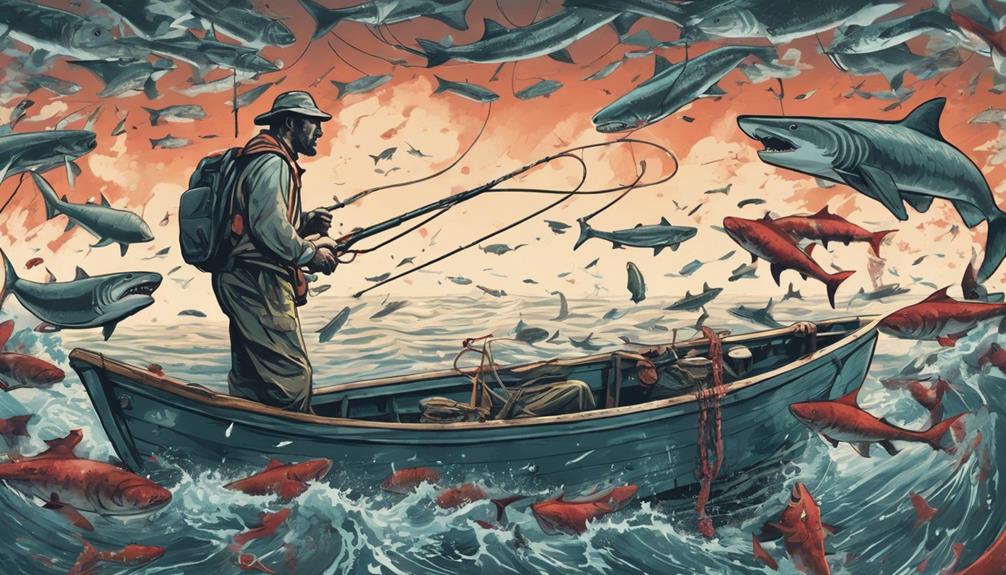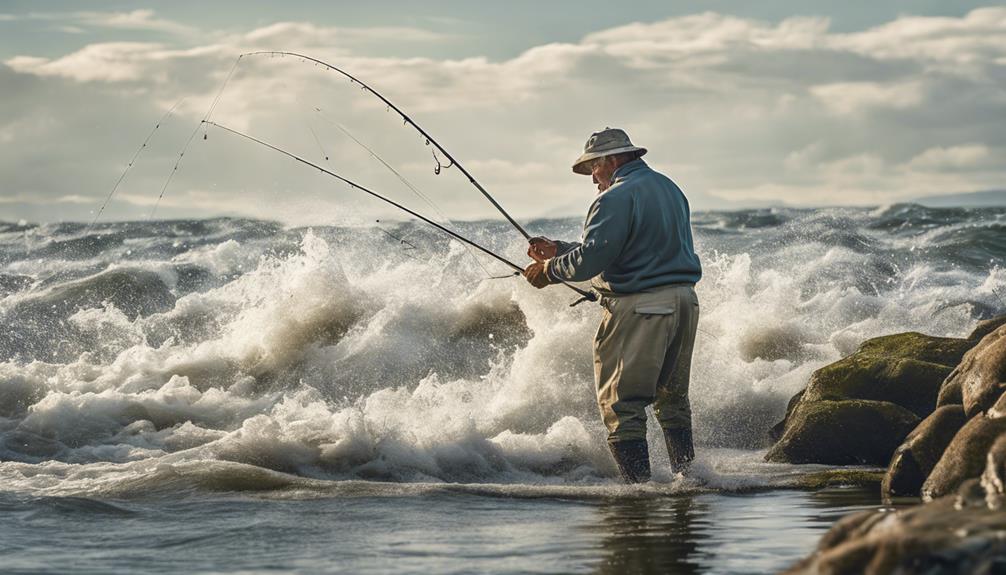When it comes to high altitude lake fishing, remember that 'patience is a virtue.' Understanding the nuances of fishing at higher elevations can make all the difference in your success on the water.
From gear selection to adjusting to the unique conditions, these essential tips will help you navigate the challenges of high altitude fishing with confidence.
So, are you ready to elevate your fishing game and reel in some unforgettable catches?
Choosing the Right Gear
When preparing for high-altitude lake fishing, selecting the appropriate gear is essential for a successful and enjoyable experience. Proper gear maintenance and equipment storage are crucial to ensure your equipment remains in top condition. Before heading out, check your gear for any signs of wear and tear, and make any necessary repairs or replacements. Keep your rods, reels, and tackle organized and protected in a secure storage container to prevent damage during transportation.
Rod selection plays a vital role in high-altitude lake fishing. Choose a rod that's lightweight yet sturdy enough to handle the challenges of fishing in mountainous regions. Consider the length and action of the rod based on the type of fish you're targeting and the specific conditions of the lake. Additionally, ensure that your reel is compatible with your chosen rod. A well-matched rod and reel combination will enhance your casting distance and accuracy, making your fishing experience more successful.
Proper gear maintenance and storage, along with careful rod selection and reel compatibility, are key factors in preparing for high-altitude lake fishing. By paying attention to these details, you can set yourself up for a productive and enjoyable fishing trip. Remember, the right gear can make all the difference in your overall experience on the water.
Understanding High Altitude Conditions
To effectively navigate high altitude conditions while fishing in mountainous regions, understanding the impact of elevation on your fishing experience is crucial. Here are some key points to help you grasp the significance of high altitudes:
- Acclimating properly: Take the time to acclimate to the high altitude before engaging in rigorous physical activities like fishing. This process allows your body to adjust to the decreased oxygen levels, reducing the risk of altitude sickness.
- Oxygen levels: At higher altitudes, the air contains less oxygen, making it harder to breathe. Be mindful of this reduced oxygen availability and pace yourself accordingly while fishing to avoid exhaustion.
- Fishing strategies: High altitude lakes often have different fish behavior due to the lower oxygen levels. Fish may be deeper or less active, requiring you to adjust your fishing techniques. Experiment with different lures and baits to optimize your chances of a successful catch while respecting the unique conditions of high altitude fishing.
Understanding how to acclimate properly, being aware of oxygen levels, and adapting your fishing strategies to high altitude conditions will enhance your overall fishing experience and reduce the risk of altitude sickness. Stay informed and prepared to make the most of your high altitude fishing adventures.
Selecting the Ideal Bait
Consider the type of fish you're targeting before choosing the ideal bait for your high altitude lake fishing excursion. Understanding bait preferences and fish behavior is crucial for a successful fishing trip. Different fish species have varying tastes and feeding habits, so selecting the right bait can significantly impact your fishing success.
Seasonal variations also play a key role in determining the ideal bait for high altitude lake fishing. During different times of the year, fish may be more active and responsive to certain types of bait. For example, in warmer months, fish tend to be more active and may prefer live bait such as worms or insects. In contrast, during colder seasons, fish may be less active and more attracted to artificial lures that mimic their natural prey.
Observing fish behavior in the specific lake you're fishing in can provide valuable insights into the best bait to use. Pay attention to what the fish are naturally feeding on and try to match your bait accordingly. By adapting to the fish's preferences and behavior, you can increase your chances of a successful fishing outing at high altitude lakes.
Mastering Casting Techniques
To improve your high altitude lake fishing skills, mastering casting techniques is essential. When fishing in high altitude lakes, the right casting technique can make all the difference in your success. Here are some tips to help you master your casting skills:
- Practice Fly Fishing: Fly fishing is a popular technique used in high altitude lake fishing. It requires precision and finesse in casting to mimic the movement of insects on the water's surface. Practice your fly fishing technique to improve your accuracy and increase your chances of catching fish.
- Focus on Line Control: Line control is crucial when casting in high altitude lakes. Proper control of your line can help you place your bait accurately and avoid tangles or snags. Pay attention to the tension in your line and practice controlling its movements for more precise casting.
- Experiment with Different Casting Angles: Don't limit yourself to one casting angle. Experiment with different angles to see which works best for the conditions of the lake you're fishing in. Changing your casting angle can help you reach different depths and cover more water, increasing your chances of attracting fish.
Navigating the Lake Terrain
Navigating the lake terrain requires understanding the underwater topography and locating potential fishing hotspots for a successful high altitude fishing experience. When venturing out to fish in high altitude lakes, it's crucial to prioritize safety equipment. Make sure you have a reliable life jacket, especially if you're fishing from a boat. Additionally, wearing appropriate footwear with good grip can help you navigate the sometimes rugged terrain around the lake.
Before you start fishing, take some time to study the terrain features. Look for underwater structures like drop-offs, submerged rocks, or vegetation where fish are likely to hide. These spots are prime locations for casting your line and increasing your chances of a successful catch. By understanding the lake's topography, you can also avoid potential hazards that may not be visible from the surface.
When exploring the lake, pay attention to any changes in the underwater terrain. Transition areas where one type of bottom composition meets another are often great fishing spots. Keep an eye out for sudden depth changes or underwater ledges where fish might congregate. By being observant and adapting to the lake's terrain features, you can enhance your high altitude fishing experience and reel in some impressive catches.
Adjusting to Weather Patterns
Adapting your fishing approach according to prevailing weather patterns can significantly impact your success at high altitude lakes. Being prepared and adjusting your strategies based on the forecast can make a huge difference in your fishing experience. Here are some essential tips to help you adjust to weather patterns effectively:
- Weather Forecasting: Stay updated on the weather forecast before heading out to fish. Sudden changes in weather can occur frequently at high altitudes, so knowing what to expect can help you plan your fishing trip accordingly.
- Acclimatization Techniques: High altitude fishing can be physically demanding due to lower oxygen levels. Take the time to acclimatize to the altitude before engaging in strenuous activities like fishing. This will help you avoid altitude sickness and perform better on the water.
- Flexibility in Approach: Be prepared to adapt your fishing techniques based on the weather conditions. If it's windy, try casting against the wind for better control. On rainy days, focus on using lures that mimic wounded prey to attract fish more effectively.
Practicing Proper Catch and Release
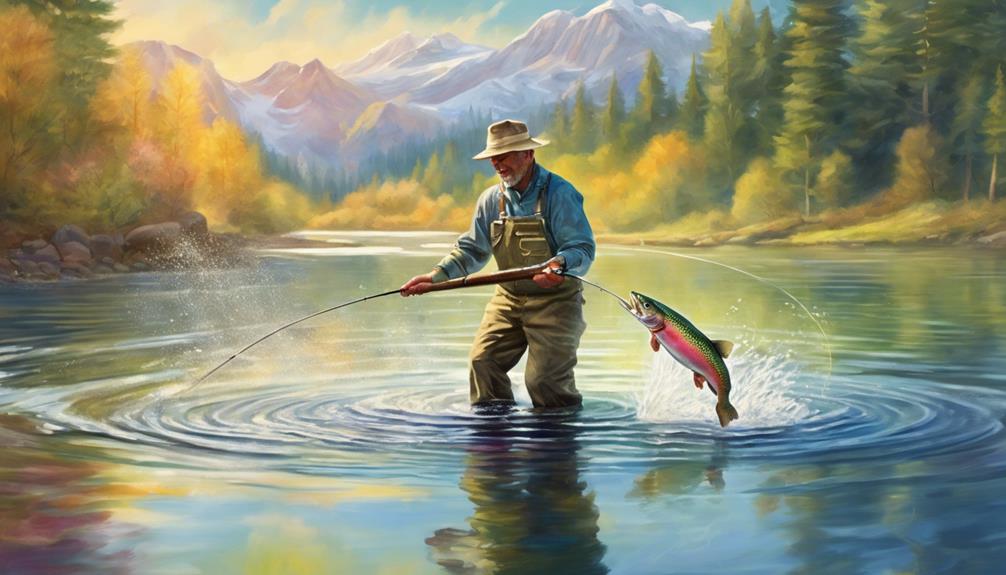
Considering the well-being of the fish population is crucial when fishing at high altitude lakes. Practicing proper catch and release techniques is essential for fish conservation, ethical fishing practices, and ensuring the sustainability of the environment. When engaging in high altitude lake fishing, it's important to minimize the environmental impact by following these guidelines.
First and foremost, always use barbless hooks when fishing in high altitude lakes. Barbless hooks cause less injury to the fish, making it easier to release them safely back into the water. This simple adjustment can significantly increase the chances of the fish surviving after being caught.
Additionally, it's crucial to handle the fish with care. Avoid touching their gills or eyes, as these are sensitive areas that can be easily damaged. Wet your hands before handling the fish to prevent removing their protective slime layer, which can lead to infections. Keep the fish in the water as much as possible while removing the hook, and support their body properly to minimize stress.
Safety Precautions at High Altitudes
To ensure your safety while fishing at high altitudes, be mindful of the potential risks associated with the elevation and take necessary precautions. High altitudes pose unique challenges that can affect your health and overall fishing experience. Here are some essential safety tips to keep in mind:
- Altitude Sickness: Altitude sickness, also known as acute mountain sickness (AMS), can occur when you rapidly ascend to high elevations. Symptoms may include headaches, nausea, dizziness, and fatigue. To prevent AMS, acclimate yourself slowly to the altitude, stay hydrated, and avoid overexertion.
- Emergency Protocols: It's crucial to familiarize yourself with emergency protocols specific to high-altitude locations. Before embarking on your fishing trip, research the nearest medical facilities, emergency contact numbers, and evacuation procedures in case of an emergency. Having this information readily available can make a significant difference in critical situations.
- Weather Awareness: Weather conditions at high altitudes can change rapidly, leading to unexpected storms or temperature drops. Always check the weather forecast before heading out, and be prepared with appropriate gear such as waterproof clothing, extra layers, and a reliable shelter in case of unforeseen circumstances.
Frequently Asked Questions
How Can I Prevent Altitude Sickness While Fishing at High Altitude Lakes?
To prevent altitude sickness while fishing at high altitude lakes, remember to stay hydrated and use acclimatization techniques. Hydration is key in preventing dehydration, a common trigger for altitude sickness.
Take it easy and give your body time to adjust to the high altitude. By gradually acclimatizing, you can reduce the risk of altitude sickness and enjoy your fishing trip to the fullest.
Are There Any Special Regulations or Permits Required for Fishing at High Altitude Lakes?
Before heading out to high altitude lakes, it's crucial to check for any permit requirements and fishing regulations in the area. Make sure you have all the necessary documentation to avoid any issues.
Additionally, be aware of safety precautions and prevent altitude sickness by staying hydrated and acclimating gradually.
Following these guidelines will ensure a smooth and enjoyable fishing experience at high altitudes.
What Types of Fish Can Typically Be Found in High Altitude Lakes?
In high altitude lakes, you'll usually find trout species like rainbow, brook, and cutthroat. These fish thrive in the cool waters.
For the best lures, try using spinners, spoons, or flies that mimic insects found around the lake.
Some top fishing spots include rocky shorelines, deep drop-offs, and areas with underwater structures where fish like to hide.
Experiment with different techniques to see what works best for you!
How Can I Properly Clean and Store My Fishing Gear After Fishing at a High Altitude Lake?
After fishing at a high altitude lake, proper storage is crucial for your gear maintenance. Make sure to clean your fishing equipment thoroughly with fresh water to remove any dirt or debris.
Dry everything completely before storing them in a cool, dry place. Storing your gear properly will help prevent corrosion and prolong the life of your fishing equipment.
Are There Any Specific Techniques for Fishing in the Colder Temperatures Often Found at High Altitude Lakes?
When fishing in the colder temperatures at high altitude lakes, remember to use winter fishing techniques. It's essential to have the right cold weather gear to stay warm and comfortable. Look for insulated clothing, gloves, and thermal socks to combat the chill.
Consider using baits and lures that are more attractive to fish in cold water. Adjust your fishing techniques to suit the conditions and increase your chances of a successful catch.
Conclusion
Now that you have mastered these essential tips for high altitude lake fishing, you're ready to tackle any challenge that comes your way.
Remember to always be prepared with the right gear, bait, and techniques to ensure a successful fishing trip.
Stay safe, respect the environment, and enjoy the breathtaking beauty of fishing at high altitudes.
Happy fishing!
